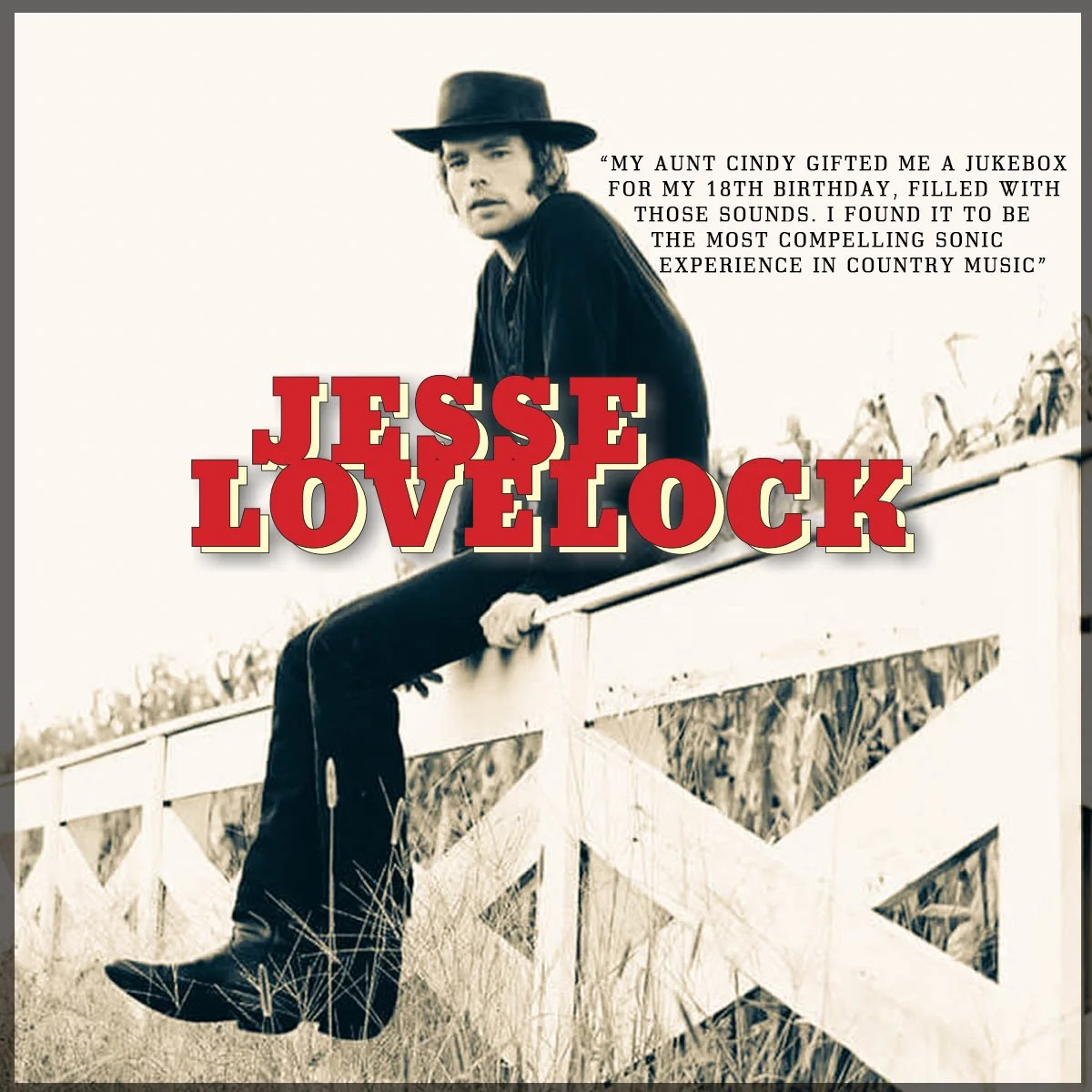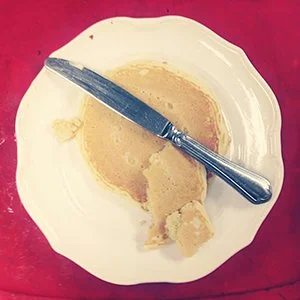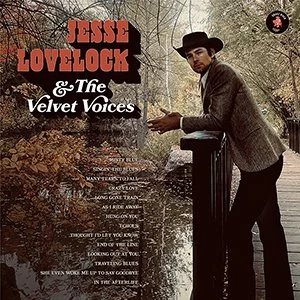It is interesting and perhaps symptomatic of continuously changing times that one of the best albums releases this year is a contemporary take on a classic sound in country music - The Nashville Sound (also known as Countrypolitan) - because I when stared to listen to traditional country it as the stripped-down hardcore honky-tonk and Bakersfield sound that drew me in. The music of the mainstream had little appeal at that time. But although it was railed against at the time by many, it has achieved a place and understanding in my listening experience. I still find it too saccharine in many examples, but the best is a sound unto itself. In recent times, there have been a number of exponents who have worked with the elements of that sound to create something of lasting integrity. Jesse Lovelock is one of those people, if not the best to date, and has released a single, Misty Blue online, while his debut album can be listened to on certain platforms too. It will doubtless be available to download and buy in time. We at Lonesome Highway took the opportunity to ask Jesse some questions about his and the album’s background.
Can you tell us a little about your background growing up?
I was born at home in Jamul, CA, in 1987. When I was three months old, my mother took me on a trip to visit my grandmother, but ended up abandoning me in Big Sur. Luckily, housekeeping found me and contacted my dad, who came up to bring me back. Since then, I haven’t seen my mother. My dad struggled on his own. My sister and I spent time in foster care while my dad worked to get his life together. He eventually managed to do so, but fell in and out of darkness along the way. I grew up fast, but I grew up right. There were good times and very bad times. I’m not the only one with that story.
What were the influences, country or otherwise, that shaped you at the time?
During that period in music, the bar was set incredibly high. We’re all trying to catch up now. While I may not have reached that bar, I definitely reached for it. I drew inspiration from artists like Pete Drake, Jean Shepard, Faron Young, Jim Reeves, Slim Whitman, and Ronnie Dove, to name a few. I have a ton of records. While you may not hear it in this project, I’ve also been heavily influenced by blues and soul singers. I was listening to the Four Tops, The Platters, and Jimmy Ruffin back in fifth grade. You might catch some of that influence in the future.
When did you begin to carve out your musical path, and what motivated you?
I believe it started as my form of escapism - trying to create beauty to mask the challenges of a broken home. I immersed myself in the arts, both visually and audibly. I remember humming melodies during my 40-minute walk home from school, zoning in on the cracks in the pavement as I hummed and whistled. Honestly, I absolutely disliked school.
When did you become drawn to the countrypolitan sound, and what specifically about it appealed to you?
Jim Reeves, Slim Whitman, and Ronnie Dove were not just my favourite singers; they also had my favorite arrangements. My aunt Cindy gifted me a jukebox for my 18th birthday, filled with those sounds. I found it to be the most compelling sonic experience in country music. She wouldn’t let me take the jukebox home until I had a permanent place for it, and I finally got it 20 years after.
The production on the album is very detailed and carefully thought through. How easy was that?
I had a vision and I could hear it before it was done. I’ve had this vision for a very long time, 2010 … or so. I waited for people ... I don’t do that anymore. I brought in a few people who could help me with that vision. That was easy. The hard part was coming in and trying to sing after welding and grinding all day. You can hear the fatigue in my voice. It was also my first time recording my voice in a real studio environment, so there’s that.
Who were the players involved in the recording?
Reggie Duncan, Jake Duncan, Mark Lewis and singers Ashley Rose and Sandy Cruz
Was there any aspect you would have changed aesthetically or because of financial restraints?
Absolutely. Oh yeah. It fell short in my ears on a couple of levels, but overall, I’m happy with what I created. I produced this record myself.
What is your thinking now that the album is out there about how to get it across to its potential audience?
I’m not good at that part. That’s for data people and number crunchers. I’m just going to try and write better songs, stay authentic and build relationships with good people.
Have you any thoughts about doing some live performances?
I have an idea of what that would look like. It’s not going to be what anyone would expect, that’s all I’ll say!
Is this the direction you’d like to explore further, or are you considering a different course for future releases?
Definitely more in this vein! But I want to see what else emerges from me. I’m also excited about the possibility of collaborating with new people.
There has often been a negative reaction to artists who try to recreate the music of an earlier era, with the belief that the classics already exist, so there’s no need to do it again. What’s your take on this?
I understand that perspective. In many ways, I agree. The goal should be to create inspired work from those influences, and I hope that’s what you’re hearing on this record. It’s abstract traditionalism, really. Or at least that’s what I’m hearing.
In many ways the album speaks for itself and offers something that may not have been on a listener’s radar before. Was that the intention, or was it something closer to home to simply record something that you loved for yourself?
Both, but like I said, even though I wasn’t putting myself out there for all these years, it doesn’t mean I wasn’t onto something early when it comes to this style of music. I had a conversation with Lou Reed when I worked at the Standard Grill in Manhattan and he gave me advice to do my work “quietly like snow” I liked that. Check this picture out below!
Picture of Lou Reeds pancakes after the advice he gave me just a few months before passing
Which current or more recent artists do you admire?
I haven’t followed contemporary artists for quite some time, but recently I’ve come across a few I really admire. Will Worden, Phil Hollie and Erik Shicotte are a few of them. I also have to mention Joel Alme from Sweden; his 2010 album, WAITING FOR THE BELLS, is truly incredible.
Do you think it’s a good time to release music in the age of streaming?
Absolutely ... I believe it’s the best time for independent artists to share their work.
What does the immediate future hold for Jesse Lovelock and the Velvet Voices?
I prefer not to speculate on things that may not happen, but if I get the chance to work with the person I’ve been in discussions with, it’ll be truly remarkable.
Interview by Stephen Rapid



